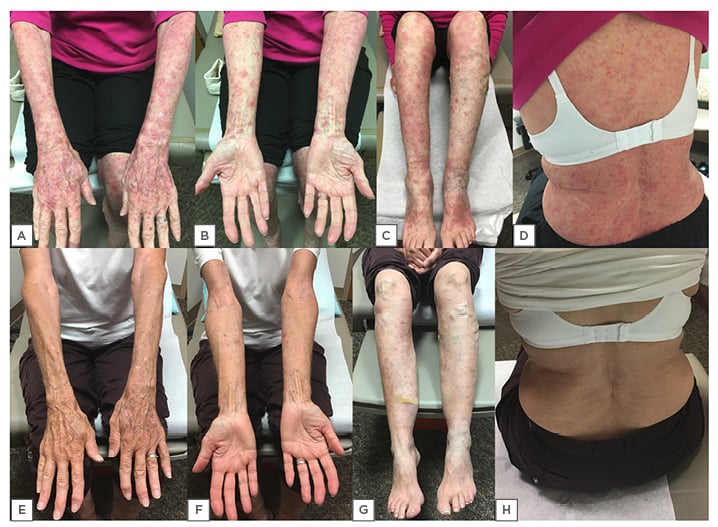Abstract
Flares of autoimmune disorders have been rarely reported after COVID-19 infection as well as vaccinations. The authors report a case of psoriasis flare after COVID-19 vaccination, which was successfully treated with topical steroids. This case illustrates that although autoimmune disease flares might be seen post-vaccination, they are usually mild and self-resolving. Therefore, based on overall safety and efficacy, COVID-19 vaccination is strongly encouraged in vulnerable patient populations.
Key Points
1. There have been rare reports of exacerbations of rheumatic and musculoskeletal diseases after COVID-19 vaccination.2. Although autoimmune disease exacerbations might be seen post-vaccination, most are mild and self-resolving.
3. Given the overall safety and efficacy of COVID-19 immunisation, vaccination is strongly encouraged in vulnerable patient populations.
FLARE OF PSORIASIS AFTER COVID-19 VACCINATION
Case Presentation
A 63-year-old female with history of psoriasis, degenerative disc disease, and osteoarthritis of the hands and knees presented with worsening skin psoriasis. They were diagnosed with plaque psoriasis 45 years ago, well-controlled with as-needed topical corticosteroid ointment. Their last exacerbation of psoriasis was more than 5 years ago and had resolved with topical management. Two weeks after receiving the second dose of the BNT162b2 mRNA vaccine (Pfizer, New York City, New York USA, and BioNTech, Mainz, Germany), the patient developed itchy erythematous scaly rashes on their extremities, chest, abdomen, and back. The physical examination revealed erythematous pustular plaques all over the body. (Figure 1A–D) They were advised to use topical triamcinolone 0.1% cream twice a day, with a plan to initiate systemic immunosuppressive therapy for psoriasis. However, before initiating immunosuppressive therapy, their rash started resolving, and completely resolved spontaneously within 6 weeks of onset. (Figure 1E–H). On evaluation 3 months after the initial presentation, the patient continued do well and did not have any more psoriasis exacerbations, despite no topical or systemic therapy.

Figure 1: Physical examination of patient revealing erythematous pustular plaques, which resolved spontaneously.
Erythematous scaly pustules and plaques 2 weeks after COVID-19 vaccination on A) dorsal arms and hands; B) volar arms and hands; C) anterior legs; and D) back. Complete resolution of the rash 6 weeks later as shown on the E) dorsal arms and hands; F) volar arms and hands; G) anterior legs; and H) back.
Discussion
COVID-19 can cause immune-overactivation and hyperinflammation, and has been associated with exacerbation of rheumatic and musculoskeletal diseases (RMD) as well as new incident RMDs.1 Concerns about autoimmunity caused by vaccines due to molecular mimicry exist, with rare reports of RMD flare after COVID-19 vaccinations.2-4 Cases of new-onset psoriasis and exacerbation of psoriasis after COVID-19, as well as COVID-19 vaccinations, have been recently reported.5-8 Fortunately, similar to this case, most cases were successfully treated with topical treatment, with few requiring systemic therapy. The findings of this report align with the currently available clinical data and illustrates that though vaccines may increase the risk of RMD flares, flares are usually mild and self-resolving. Given the overall safety and efficacy of COVID-19 immunisation, the proven benefits of vaccinating vulnerable patients outweigh the potential theoretical risk of disease flare and vaccination shall be strongly encouraged.
Key Points
- Rare exacerbations of underlying RMDs have been reported after COVID-19 vaccinations.
- Most exacerbations are mild and self-resolving and do not require aggressive treatment.
Patient’s Perspective
The patient is enthusiastic about sharing their experience and appreciates an opportunity to help the medical community. They want their case to be a reassuring example for those who have concerns about the COVID-19 vaccines, and strongly encourage everyone to get vaccinated for COVID-19.







